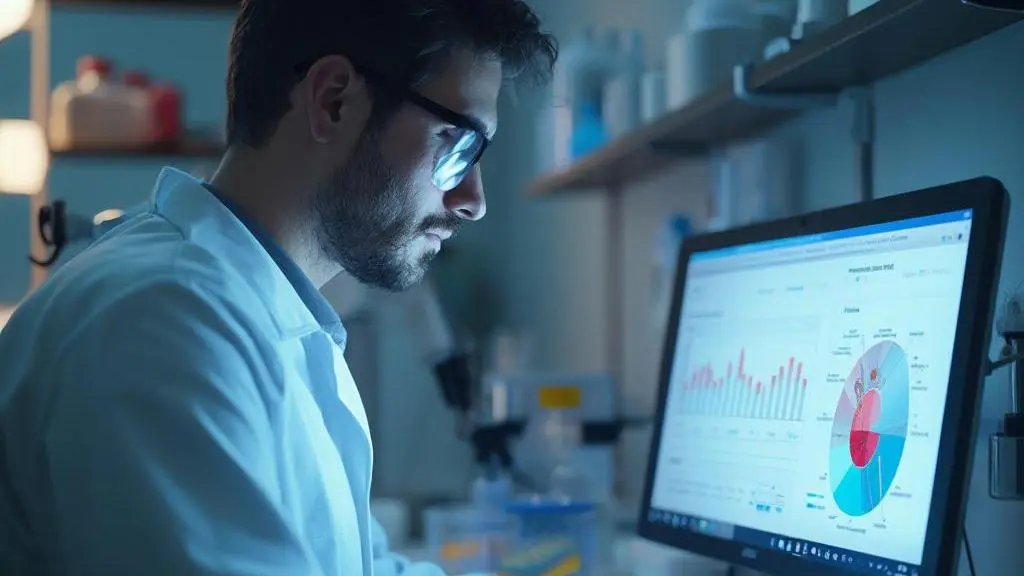Biomedical research is at the forefront of healthcare innovation, driving advancements that improve patient outcomes and revolutionize medical practices.
Technological Innovations in Biomedical Research
Technological advancements are revolutionizing biomedical research. From AI-driven diagnostics to nanotechnology, these innovations are enhancing the accuracy and efficiency of medical treatments. For instance, AI algorithms can analyze vast amounts of data to predict disease outcomes and personalize treatment plans. AI and machine learning are increasingly being used to detect patterns and correlations that humans might miss, leading to earlier diagnoses and better patient outcomes. Nanotechnology, on the other hand, enables targeted drug delivery systems that improve therapeutic efficacy. Nanoparticles can be engineered to deliver drugs directly to affected cells, reducing side effects and increasing the effectiveness of treatments. This precision is particularly valuable in cancer research, where targeted therapies can minimize damage to healthy tissue. Additionally, advancements in biomedical imaging have significantly improved diagnostic accuracy. Techniques like magnetic resonance imaging (MRI) and positron emission tomography (PET) provide detailed images of the body’s internal structures, aiding in the early detection of diseases. These technological innovations not only improve patient care but also open new avenues for research, pushing the boundaries of what is possible in biomedical science.
Ethical Considerations and Regulations
As biomedical research advances, ethical considerations and regulatory frameworks become increasingly important. Ensuring patient consent, data privacy, and ethical conduct in research is crucial. Regulatory bodies play a vital role in overseeing these practices, ensuring that innovations are developed responsibly and ethically.
Patient consent is fundamental. It ensures that individuals are informed about the research and voluntarily agree to participate. This process must be transparent, with clear communication about the study’s purpose, potential risks, and benefits. Regulatory bodies enforce strict guidelines to protect participants, emphasizing the importance of informed consent. Cybersecurity best practices are essential to safeguard sensitive data.
Data privacy is another critical aspect. Biomedical research often involves handling sensitive personal and medical information. Protecting this data from unauthorized access and breaches is paramount. Robust infrastructure security strategies and data encryption methods are employed to secure this information. Additionally, compliance with data protection regulations ensures that data is managed ethically.
Ethical conduct in research extends beyond consent and privacy. It includes fair treatment of participants, avoiding conflicts of interest, and ensuring the integrity of research findings. Ethical guidelines are continuously updated to address emerging challenges, such as the ethical implications of AI in healthcare. Regulatory bodies monitor adherence to these guidelines, ensuring that research is conducted with the highest ethical standards. Regulations also cover the ethical use of advanced technologies like AI and nanotechnology, ensuring they are used responsibly.
The Role of Cloud Infrastructure in Research
Cloud infrastructure is becoming integral to biomedical research, offering scalable and secure solutions for data storage and analysis. Cloud services enable researchers to collaborate globally, share data seamlessly, and access powerful computational resources. However, ensuring the security and integrity of this data is paramount. As biomedical research advances, the need for robust cloud infrastructure becomes evident. Effective cloud infrastructure configuration ensures that data is stored and processed securely, adhering to regulatory guidelines. This is particularly important given the ethical considerations discussed in the previous chapter. Proper configuration helps in maintaining data privacy and patient consent protocols, as outlined by regulatory bodies. Additionally, DNS management plays a crucial role in securing the infrastructure. Proper DNS management ensures that data is routed correctly and securely, minimizing the risk of breaches. This aspect is closely tied to the upcoming discussion on digital security and vulnerability assessment. For more on DNS management, refer to DNS management best practices. By focusing on these areas, cloud infrastructure can provide a secure and efficient environment for biomedical research.
Digital Security and Vulnerability Assessment
With the increasing reliance on digital technologies, digital security has become a critical concern in biomedical research. Protecting sensitive patient data and research findings from cyber threats is essential. Our services include comprehensive vulnerability assessments and digital security audits to identify and mitigate potential risks. By ensuring a secure research environment, we help protect valuable data and maintain the integrity of research outcomes.
Vulnerability assessments involve a systematic examination of the research infrastructure to identify weaknesses that could be exploited by cyber threats. This process includes scanning for known vulnerabilities, evaluating the effectiveness of existing security measures, and simulating potential attacks to understand their impact. More on vulnerability assessment here. Digital security audits, on the other hand, provide a detailed review of security policies, procedures, and practices, ensuring they are up-to-date and effective. These audits help in identifying gaps in the security framework and provide recommendations for improvement.
By conducting regular vulnerability assessments and digital security audits, research institutions can stay ahead of emerging threats. These assessments are crucial for complying with regulatory requirements and maintaining trust with research participants and stakeholders. Effective digital security measures ensure that biomedical research can proceed without the risk of data breaches or unauthorized access, thereby safeguarding the confidentiality and integrity of research data.
Final words
Biomedical research continues to push the boundaries of what is possible in healthcare. From advanced technologies to innovative medical practices, the future of healthcare is bright. As we move forward, it is essential to ensure that our research environments are secure and efficient. For robust digital security and managed cloud services, contact us to learn more about our comprehensive solutions at a competitive price.















Leave a Reply